A Thousand Words

Welcome back to "A Thousand Words," my new OT in which I post a picture of something I'd like to see more of in the world, because, well, you know what a picture's worth. ![]()
Last week I focused on natural phenomena; this week, I'm back to the man-made.
I would like more libraries in the world.

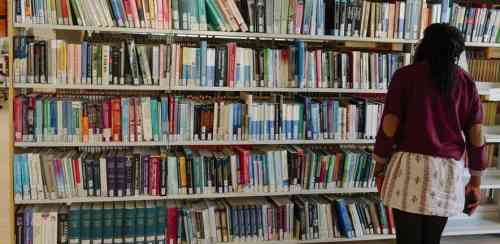

The oldest library that we know of came out of Nineveh, which in modern terms lies within Iraq. It was founded in the 7th century B.C. by Ashurbanipal, then ruler of Assyria, for "royal contemplation." I'm assuming somebody other than Ashurbanipal used it when he wasn't feeling contemplative, but possibly not.
EDIT: OK, it appears my sources were occidental-centric. Can't imagine why I didn't notice that when I was writing this, but Kate, bless her heart, said, "What about China?" and then brought up India. So, until I find out what was going on in Asia, let's just say that Ashurbanipal founded the first Western library.
He was a hell of a bookworm for the times (he not only collected religious works and works of scholarship, but also literature), but he was one of those people who borrow books and don't return them. Or, well, that's a nice way of putting what he did. He basically looted other people's troves and took the books back to his library.
Ashurbanipal used war loot as a means of stocking his library. Because he was known for being cruel to his enemies, Ashurbanipal was able to use threats to gain materials from Babylonia and surrounding areas.[8] Ashurbanipal's intense interest in collecting divination texts was one of his driving motivations in collecting works for his library. His original motive may have been to "gain possession of rituals and incantations that were vital to maintain his royal power."
https://en.wikipedia.org/wiki/Library_of_Ashurbanipal
"The British Museum's Ashurbanipal Project"
Jeanette Fincke
It's a bit of historical comeuppance that the British actually ended up looting Ashurbanipal's library in the 19th century. But at least he was done with it by then--unlike the people he stole from! On the other hand, some of these stolen works were war plunder, so possibly they were.
The Villa of the Papyri is the oldest library still (more or less) intact. It was caught in Vesuvius' 79 AD eruption, and, oddly enough, ended up being preserved by that process. They think the villa originally belonged to Julius Caesar's father-in-law, Lucius Calpurnius Piso Caesoninus, and that it originally looked something like this:
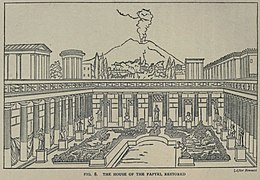
This is what it looks like today:
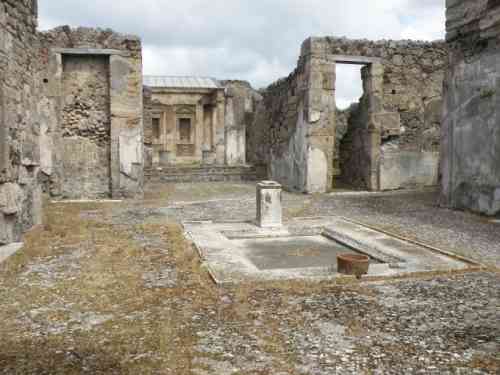
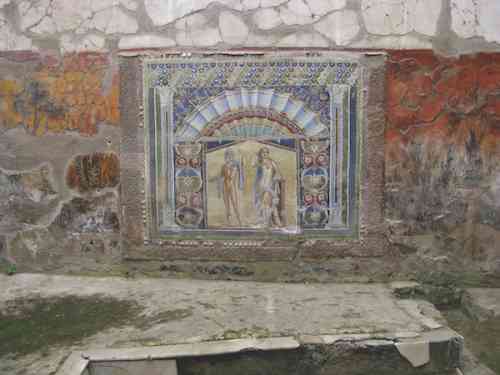
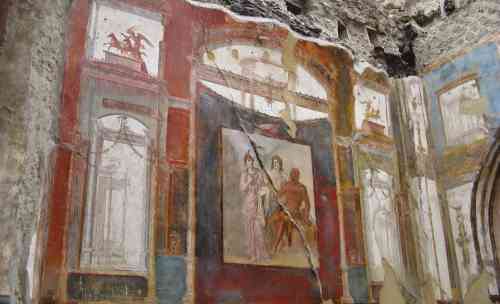
Look at that mosaic floor...
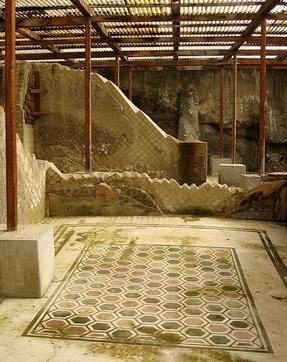
Many of the papyrus scrolls are apparently carbonized, but fairly intact: enough so that scientists are still looking for ways to read them (with some success):
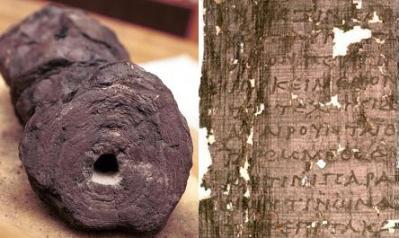
The Villa was unearthed in the 18th century, so I guess we're lucky that eighteenth-century archaeological practices didn't finish off the manuscripts! No offense intended to those expert looters, who I'm sure were using best practices of their day, but they didn't have the technology to enable them to approach the material delicately. Nowadays, people aren't trying to open the scrolls to read them, but are trying to find ways to read them while closed, (such as X-rays) which should help preserve them:
It is the only library from antiquity to have survived. When Vesuvius erupted, the Villa of the Papyri was hit by a 600-degree Fahrenheit blast of hot gas and ash, which instantly carbonized the papyrus scrolls, transforming them into charred cylindrical lumps, and, surprisingly, preserving them. Since their discovery more than 250 years ago, scholars have attempted to unroll and translate the fragile scrolls, many of which contain Greek texts on Epicurean philosophy, particularly some written by the philosopher Philodemus. Recently, a team of scientists has pioneered a new, safer method of deciphering the texts. Since unrolling causes irreparable harm to the brittle artifacts, researchers have turned to noninvasive technologies such as X-rays, digital photography, and microscopy
https://www.archaeology.org/issues/175-1505/trenches/3166-trenches-italy...
And of course, one can't forget this library:
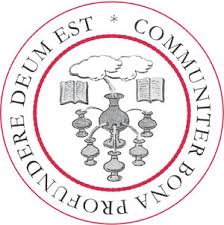
The first public library we know of was founded in Philadelphia, by Benjamin Franklin and a group of his peers, in 1731. They took as their motto the Latin phrase Communiter Bona profundere Dêum est, meaning "to pour out benefits for the common good is divine," and, until the rise of the Philadelphia Free Library in the late nineteenth century, Franklin's library did just that.
It was housed in a number of different buildings. Early in its existence, it was always a next-door neighbor to the developing government, and served as the first Library of Congress:
Throughout the eighteenth century, the library was itinerant, though always well-situated, occupying the west wing of the State House in 1740 and the second floor of Carpenters’ Hall by 1773, where it served as the library of the Continental Congress and of the Constitutional Convention. By the 1790s, with more than five hundred members (about a tenth of the city’s households), the library also played a part in the new federal government complex on the State House (later Independence) Square. In the first building of its own just south of Chestnut Street, at Fifth and Library Streets, the Library Company served as the de facto Library of Congress until the government moved to Washington, D.C., in 1800.
https://philadelphiaencyclopedia.org/archive/library-company-of-philadel...
In 1789, needing more space and desirous of a building of their own, the Library Company bought a parcel of land near the corner of Philadelphia's Fifth and Chestnut Streets. Dr. William Thornton, an amateur architect won the design competition.
https://www.ushistory.org/franklin/philadelphia/library.htm
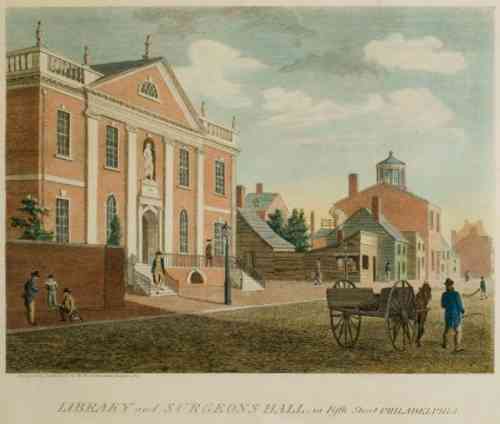
In 1869, the son of revolutionary Benjamin Rush made a substantial donation of books and money to expand the library, but with several instructions included in his will that restricted the types of materials that could be collected. He also left the choice of location to his executor, who chose an out-of the way location on Broad and Christian St:
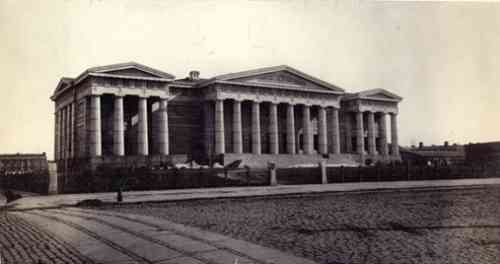
In order to have a presence downtown, they also built a second library building, this one designed by Frank Furness.
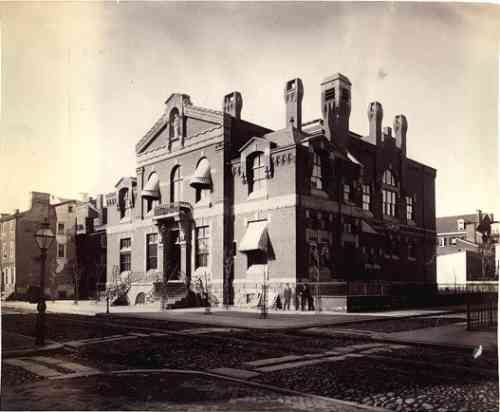
This is one of the genuinely good things accomplished in early America. I wish there were more such efforts.
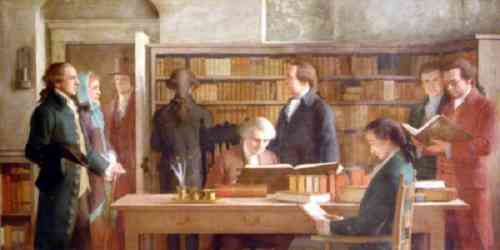
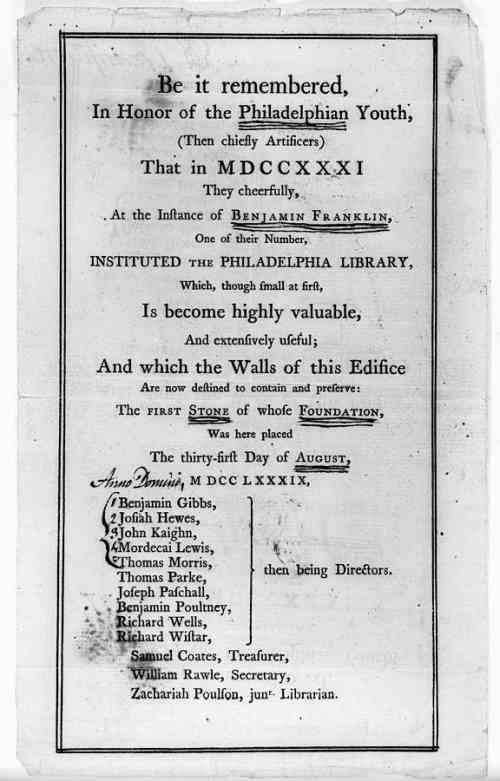


Comments
What do you think....
How about a new holiday?
We could celebrate August 31 as Public Library Day (it's the date on the foundation stone).
That was 48 years after Franklin et al actually founded the lending library on July 1, 1831, but isn't July 1st already taken as Canada Day?
"More for Gore or the son of a drug lord--None of the above, fuck it, cut the cord."
--Zack de la Rocha
"I tell you I'll have nothing to do with the place...The roof of that hall is made of bones."
-- Fiver
Good morning...
Oldest library I've been to is in St Gallen, Switzerland.
https://www.thisismysaintgallen.com/the-abbey-library/
I like the idea of library day. Used to be knowing the library was the key to good research. All that seems to have moved on line. Thanks for the OT. Have a good day.
“Until justice rolls down like water and righteousness like a mighty stream.”
Good morning CSTMS. Library Day sounds like a wonderful idea.
We should get one instituted before they are done away with in the name of greed. As you know, copyright has been extended preposterously already and is sure to be extended again when certain works risk becoming public domain. Meanwhile, at least one on-line library was sued for lending books and the suit, of course, made others reluctant to do so.
I'll also use this opportunity to plug the Internet Archive at https://archive.org/ a collection that keeps growing both as to amount of content and types of content. If you haven't visited in a while it's always worth a look, if only to check out the homepage and see what enticing rabbit holes pop up there.
And, speaking of perpetual copyright, the following is protected by both trademark and constant revisions & updates extending the original:
be well and have a good one
That, in its essence, is fascism--ownership of government by an individual, by a group, or by any other controlling private power. -- Franklin D. Roosevelt --
I don't know if this is news to anyone here
but there's also Project Gutenberg.
And, of course, here are the books.
"The greatest shortcoming of the human race is our inability to understand the exponential function." -- Albert Bartlett
"A species that is hurtling toward extinction has no business promoting slow incremental change." -- Caitlin Johnstone
I love pictures of old libraries
When I lived in New York, I'd often go to the big public library just to sit in their main reading room.
My photo for the day is of the natural world. The giver of life you might say. Soil rich in microbes. Microbial activity in soil helps plants grow, keeps the soil warmer during cold temperatures, and also pulls carbon from the air into the soil where it nourishes the plants.
So, how do we get more microbes into our soil? By composting.
I'd like to see more of that in the world.
Thanks for hosting. I'm really enjoying coming up with themes and pictures for this OT every week!
There is always Music amongst the trees in the Garden, but our hearts must be very quiet to hear it. ~ Minnie Aumonier
I love libraries
Thank you for this. Great memories. I visited some in Europe but can't remember the names. When I was young I lived in Portland for a while and the downtown library there had a record collection of folk music around the world. I checked them out and played them on my cheap record player. Kurdish music was my favorite.
Take good care, all.
Stop Climate Change Silence - Start the Conversation
Hot Air Website, Twitter, Facebook
I loved the Library in Dublin.
I saw the kells.
When I was 15, seems I had pretty much finished with everything my high school had to offer, so I spent my days in the library, helping the librarian, and doing a writing assignment the teachers would send me. And I read lots of books!
The class I attended was band, and I was allowed to take a private piano lesson, and played the piano for the school choir. The librarian was also a teacher who had jut transitioned to a job less hectic than classroom, but he taught. He would grab a book, tell me to read it, write about it. I consider that my best year in public school I went off to college at age 16.
My Dad, from a family that was the poorest of the door during the Depression, spent his afternoons in the library because it was warm, and sometimes the librarian would give him food. He read and read, was still reading books when he died at age 91. He was a staunch supporter of our town's library.
Thanks for bringing these library memories to mind.
"We'll know our disinformation program is complete when everything the American public believes is false." ---- William Casey, CIA Director, 1981
I do love libraries. Big and small.
From the little Carnegie Public Library that we would stop at every Sunday after church, until Mom left the church in 1968 when the priest spoke in favor of the war in Vietnam, to the many university libraries I've haunted over the years...
And. And, your essay reminds me that I would like to see more *librarians* in the world. Or at least people who *act* like librarians. Knowledge keepers, who love to share and help us inform ourselves about our world.